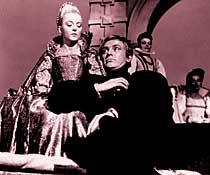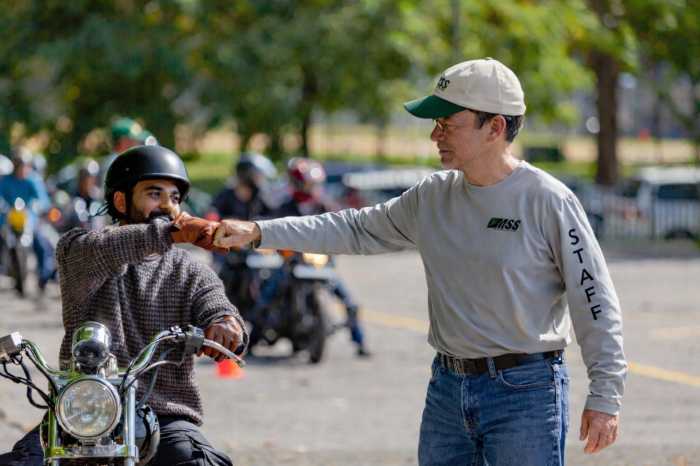Russian cinema has always had its share
of geniuses. Directors like Sergei Eisenstein, Vsevolod Pudovkin
and Alexander Dovzhenko, who were all active from the silent
era of the 1920s right into the ’40s, each made at least one
masterpiece – Eisenstein’s "Alexander Nevsky" and "Ivan
the Terrible," Pudovkin’s "Mother" and Dovzhenko’s
"Earth."
Following World War II, Stalin’s noose-like restriction of artists
not surprisingly made for a floundering in the film industry.
It was not until after Stalin’s death in 1956, when his successor,
Nikita Khrushchev, denounced his policies, that Soviet directors
were again able to flourish.
It is that upswing in artistry from an entire generation of filmmakers
that is the basis for "Soviet Sixties," a selection
of a dozen films that show just how powerful these directors’
visions were when left unshackled by state censorship. If you
missed any of the 25 films that the Film Society of Lincoln Center
presented under the rubric "Revolution in the Revolution"
last November, then this will be your last chance to see any
of these 12 unearthed classics before the prints return to Russia.
"Soviet Sixties" only skims the surface of the revelatory
filmmaking that came from Russia – indeed, much of Europe – in
that tumultuous decade. Taking their cues from such groundbreaking
European directors as Antonioni, Bergman, Fellini and the members
of the French and Czech New Waves, Russian directors turned away
from the social realism that dragged Soviet art through the mire
of Stalinism and made intensely personal, daring and occasionally
impenetrable films that had the virtues of originality and insight.
The series opener, Mikhail Romm’s "Nine Days in One Year"
(1961), was one of the biggest hits in Russian movie houses;
upon its release, nearly 25 million people went to see this metaphorical
treatise on the nuclear arms race, wherein two opposing scientists
(representing Communist idealism and jaded cynicism) argue about
the aims and realities of the Cold War.
Closing the series is a film by Ilya Averbakh that was actually
made in 1972 – stretching the series’ title a bit – and one of
the very few Soviet films of that era to actually deal with a
theme that was running rampant throughout the world at that time:
the generation gap. Averbakh’s "Monolog" studies an
out-of-touch college professor who must deal with the unexpected
return of his free-spirited daughter, who has come back with
a youngster of her own.
In between, are several films that are not to be missed. Gleb
Panfilov, one of the most prolific of his country’s filmmakers
– indeed, his latest film, "The Romanovs," about the
last Czar and his ill-fated family, was shot just last year –
is represented by two completely diverse pictures that demonstrate
Panfilov’s mastery of a wide variety of material.
"No Ford in the Fire" (1967), set during the 1917 October
Revolution, is an achingly honest portrait of a young nurse who
finds love and pain with a wounded soldier. The film contains
an unforgettable performance by Inna Churikova. The more playfully
satirical "Debut" (1970), again stars Churikova, this
time as a factory worker chosen to play Joan of Arc in a movie.
Grigory Kozintsev, an iconoclastic theater director, was best
known for his literary and stage adaptations. After tackling
Cervantes’ "Don Quixote" with mixed results in the
late-’50s, Kozintsev went after even bigger game. His "Hamlet"
(1964) is an exciting, thoroughly cinematic interpretation of
perhaps Shakespeare’s most difficult tragedy. Before his death
in 1973, Kozintsev went on to even greater artistic heights with
his visually poetic adaptation of "King Lear."
Perhaps the most original Russian filmmaker of her time, Larissa
Shepitko showed her talent right from the start of a storied
career cut short in 1979 by a fatal car accident. Her first feature,
1963’s "Heat," was made when she was only 25, but already
her individual style was apparent in its story (based on Chingiz
Aitmanov’s "Camel’s Eye") of a young state farm volunteer
whose modernist views butt heads with the all-too-reactionary
official who runs the place.
Shepitko’s later films, culminating in her prize-winning masterpiece
"The Ascent" (1976), have cemented her reputation as
one of Russia’s preeminent directors – and the qualifiers "female"
and "of her generation" are happily not needed.
The "Soviet Sixties" film
series will play at BAMCinematek, 30 Lafayette Ave. at Ashland
Place, Dec. 3-20. Tickets are $9; $6 for students, seniors, children
under 12 and BAM Cinema Club members. For screening times, call
the BAMCinematek hotline at (718) 636-4100, or visit the Web
site at www.bam.org.
The films
Dec. 3, "Nine Days in One Year," directed by Mikhail
Romm
Dec. 4, "Heat," directed by Larissa Shepitko
Dec. 6, "No Ford in the Fire," directed by Gleb Panfilov
Dec. 7, "Brief Encounters," directed by Kira Muratova
Dec. 10, "Debut," directed by Gleb Panfilov
Dec. 11, "The First Teacher," directed by Andrei Konchalovsky
Dec. 12, "The Letter that was Never Sent," directed
by Mikhail Kalatozov
Dec. 13, "Goodbye, Boys," directed by Mikhail Kalik
Dec. 14, "I am Twenty," directed by Marlen Khutsiev
Dec. 17, "Hamlet," directed by Grigory Kozintsev
Dec. 18, "Pirosmani," directed by Georgy Shengelaya
Dec. 20, "Monolog," directed by Ilya Averbakh

























